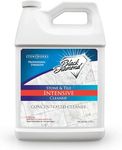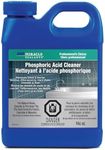Buying Guide for the Best Porcelain Tile Cleaners
Choosing the right porcelain tile cleaner is important to keep your floors and surfaces looking their best without causing damage. Porcelain tiles are durable and resistant to stains, but using the wrong cleaner can leave residues, dull the finish, or even harm the grout. When shopping for a cleaner, it's important to consider the type of porcelain tile you have (glazed or unglazed), the level of dirt or stains you need to tackle, and whether you want a product for regular maintenance or deep cleaning. Understanding the key features of tile cleaners will help you select the best fit for your needs.pH LevelThe pH level of a cleaner tells you how acidic or alkaline it is. For porcelain tiles, a neutral pH (around 7) is usually safest because it cleans effectively without damaging the tile or grout. Acidic cleaners (low pH) can remove tough stains but may harm grout or dull the tile if used too often, while alkaline cleaners (high pH) are good for cutting grease but can leave residues. If you’re doing regular cleaning, stick with a neutral pH. For deep cleaning or stain removal, you might use a more specialized cleaner, but always check if it’s safe for porcelain.
Residue-Free FormulaA residue-free formula means the cleaner won’t leave behind a sticky or cloudy film after use. This is important because residues can attract more dirt and make your tiles look dull. Some cleaners, especially those with strong chemicals or soaps, can leave residues if not rinsed properly. If you want your tiles to stay shiny and easy to maintain, look for a cleaner that specifically says it’s residue-free, especially if you don’t want to spend extra time rinsing.
Compatibility with GroutPorcelain tile cleaners can sometimes affect the grout between tiles. Some cleaners are safe for both tiles and grout, while others may cause discoloration or damage to the grout lines. If your tiles have light-colored or delicate grout, make sure the cleaner is labeled as grout-safe. For areas with a lot of grout or if you’re cleaning both tiles and grout at once, this feature is especially important.
Scent and SensitivityThe scent of a cleaner can make a big difference, especially in enclosed spaces. Some cleaners have strong chemical smells, while others are fragrance-free or use natural scents. If you or anyone in your home is sensitive to smells or chemicals, look for a low-odor or hypoallergenic option. This is also a good idea if you’re cleaning in kitchens or bathrooms where strong scents can linger.
Application MethodTile cleaners come in different forms, such as sprays, concentrates, or ready-to-use liquids. Sprays are convenient for spot cleaning or small areas, while concentrates need to be diluted and are better for large spaces. Ready-to-use liquids are easy but may be more expensive per use. Think about how much area you need to clean and how often you’ll use the product. If you want convenience, go for a spray or ready-to-use formula. For regular, large-scale cleaning, a concentrate might be more practical.
Eco-FriendlinessEco-friendly cleaners are made with biodegradable ingredients and are less likely to harm the environment or indoor air quality. If you’re concerned about sustainability or have pets and children, look for cleaners that are labeled as non-toxic, biodegradable, or environmentally safe. These are usually gentler on both your tiles and the planet.















